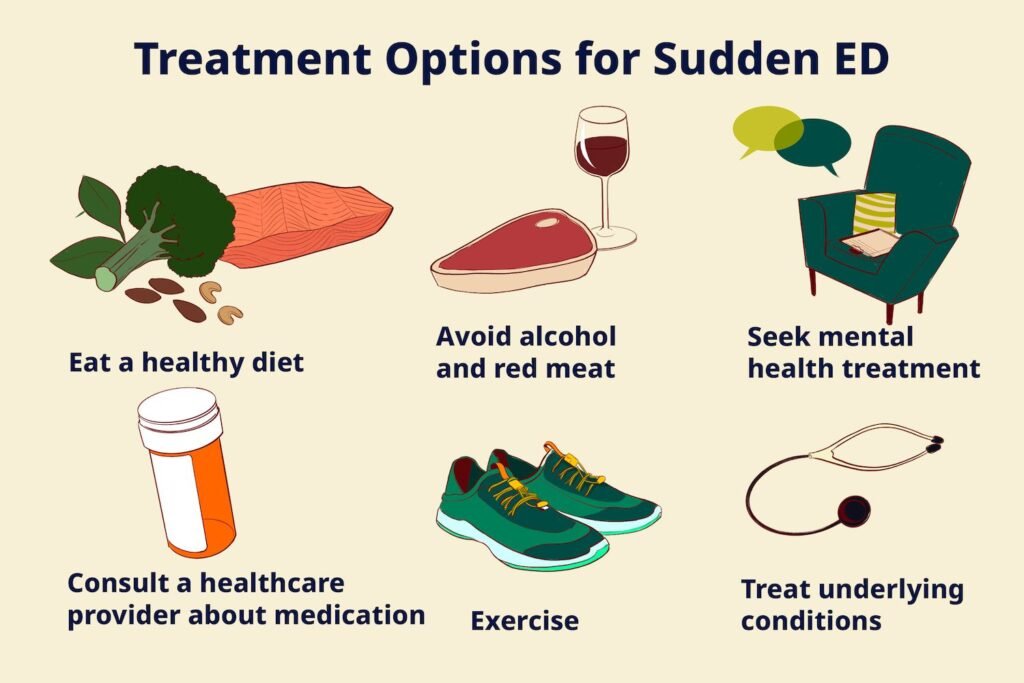Erectile dysfunction (ED) affects millions of men worldwide, impacting self-esteem, relationships, and overall quality of life. While many men fear that ED is a permanent condition, recent research paints a more hopeful picture. In many cases, erectile dysfunction is reversible, especially when the underlying causes are addressed early and effectively.
In this article, we’ll explore the causes of ED, when it’s reversible, and what the latest scientific studies say about treating and overcoming this common condition.
What Is Erectile Dysfunction?
Erectile dysfunction is defined as the consistent inability to achieve or maintain an erection firm enough for sexual intercourse. It can be occasional or chronic and may stem from physical, psychological, or mixed causes.
Causes of Erectile Dysfunction
Understanding the root cause is key to determining whether ED can be reversed. ED may be caused by:
1. Physical Causes
- Vascular disease (e.g., atherosclerosis)
- Diabetes
- High blood pressure
- Obesity
- Low testosterone
- Neurological disorders (e.g., Parkinson’s, multiple sclerosis)
- Pelvic surgery or trauma
2. Psychological Causes
- Anxiety
- Depression
- Stress
- Relationship issues
- Performance anxiety
3. Lifestyle Factors
- Smoking
- Excessive alcohol use
- Lack of physical activity
- Poor diet
- Sleep disorders
Is ED Reversible?
Yes—in many cases, erectile dysfunction is reversible, especially when it is caused by modifiable lifestyle factors, psychological issues, or reversible medical conditions. The key lies in identifying and treating the root cause. Here’s how the reversibility breaks down:
| Cause of ED | Reversible? | Approach |
|---|---|---|
| Lifestyle-related (smoking, alcohol, obesity) | Yes | Lifestyle changes |
| Psychogenic (anxiety, stress) | Yes | Therapy, stress reduction |
| Medication-induced | Often | Switching drugs under supervision |
| Hormonal (low testosterone) | Often | Testosterone replacement |
| Vascular or diabetic | Sometimes | Lifestyle changes, medication, therapy |
| Post-surgical nerve damage | Rarely fully | Penile rehab, medical devices |
What the Latest Research Says
1. Lifestyle Changes Can Reverse ED
A landmark study published in the Journal of Sexual Medicine found that men who adopted healthy lifestyle changes—such as weight loss, improved diet, increased physical activity, smoking cessation, and reduced alcohol use—experienced significant improvements in erectile function without medication.
🧠 Key Insight: Losing just 10% of body weight can significantly improve ED in obese men.
2. Psychological ED Is Highly Reversible
Research shows that men with psychogenic ED (due to stress, anxiety, or depression) often see full reversal with cognitive behavioral therapy (CBT), mindfulness practices, and sexual counseling.
🧠 Key Insight: Performance anxiety is one of the most common reversible forms of ED in younger men.
3. PDE5 Inhibitors Work Better When Underlying Conditions Are Treated
Medications like Viagra (sildenafil) and Cialis (tadalafil) are effective for many, but their success rate increases when combined with treatment for underlying issues like diabetes, low testosterone, or hypertension.
📚 A 2022 meta-analysis confirmed that combining lifestyle changes with medication leads to better outcomes than medication alone.
4. Penile Rehabilitation After Prostate Surgery Shows Promise
For men who develop ED after prostate cancer surgery, studies support the use of early penile rehabilitation (using PDE5 inhibitors, vacuum devices, or injections) to improve chances of partial or full recovery.
Can Natural Treatments Help?
Some evidence supports the use of natural therapies like:
- L-arginine and L-citrulline: Amino acids that boost nitric oxide, improving blood flow.
- Panax ginseng: May improve erectile function in some men.
- DHEA and zinc: May help with hormone-related ED.
⚠️ Caution: Always consult your physician before using supplements, as they can interact with medications or cause side effects.
When Is ED Not Reversible?
ED may be more difficult to reverse when caused by:
- Permanent nerve damage
- Severe vascular disease
- Advanced diabetes or long-term uncontrolled hypertension
- Pelvic radiation or radical prostatectomy
In such cases, treatment focuses on management, and solutions like penile implants or combination therapy can offer excellent outcomes.
How to Begin Reversing ED
Here’s what you can do to start improving or reversing ED:
- Get a Medical Evaluation
Identify the root cause—physical, psychological, or both. - Adopt Healthy Habits
Exercise, eat a heart-healthy diet, quit smoking, and limit alcohol. - Manage Chronic Conditions
Keep blood sugar, cholesterol, and blood pressure under control. - Address Mental Health
Seek counseling for stress, anxiety, or relationship issues. - Follow Up
Work with your doctor to adjust medications or add new treatments.
Final Thoughts
Erectile dysfunction does not have to be a lifelong problem. For many men, ED is a treatable and even reversible condition—especially when addressed early with the right combination of medical care, lifestyle improvements, and psychological support.
If you’re struggling with ED, don’t wait. Talk to a urologist or men’s health specialist to explore the best path forward. You may be closer to a full recovery than you think.




